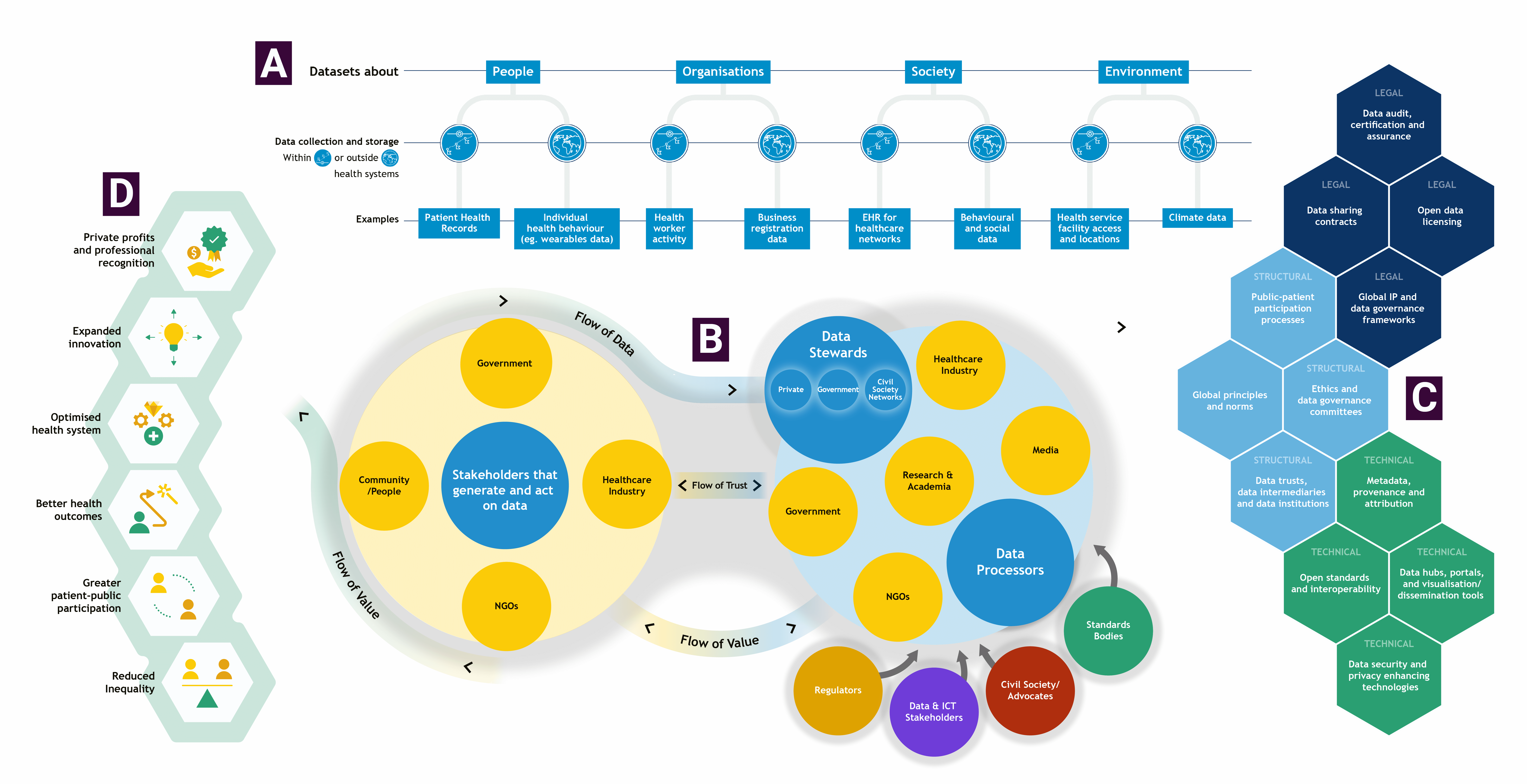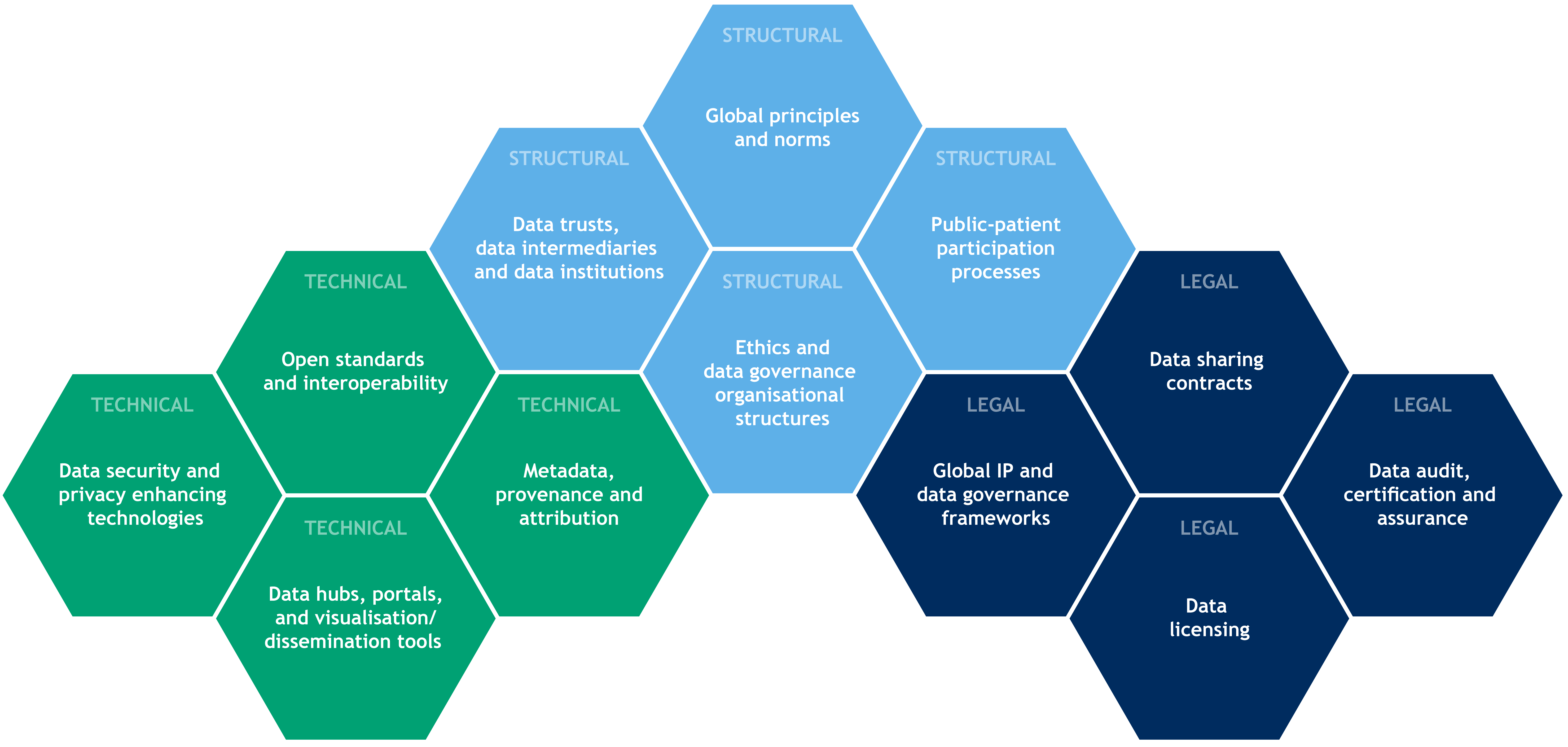
The Open Data Institute (ODI) was commissioned by the World Health Organization (WHO) to undertake research to support WHO-hosted Global Health Data Governance Summits in June and September 2021. We provided a review of the current landscape of health data, made a case for health data being a global public good, and reviewed principles and good practices for governing health data.
Industry interviews
We designed a research model and interviewed global health data leaders on key areas in data governance.
This research found that while there is recognition of health data as a global public good, there are several debates which are unresolved. These debates are preventing health leaders from agreeing to open health data or to enable health data infrastructure as a digital public good. Our research found that these debates need to be recognised and addressed more openly in order to avoid cycles of general agreement on high-level principles but which are then unable to be enacted because of not addressing the nuanced nature of the debates.
Literature review and desktop research
We reviewed policy papers and academic papers related to data governance, including internal draft WHO policies and summaries of previous WHO work in this area.
We created a table of common themes and findings from each report to inform the design of a value flow model for health data ecosystems, and to catalogue common components in health data governance processes and systems.
The key findings from our desktop research included:
- Many reports describe data governance and provide principles, but there are few clear documents that catalogue all components of a health data governance system, or that explain how data governance processes should be applied at each stage of the data journey.
- There are limited attempts to provide a comprehensive overview of the health data ecosystem that identifies all stakeholders and that shows, through an ecosystem map, the relationships between various stakeholders and value and trust flows.
WHO Data Governance Summit pre-reads
We drew on the industry interviews, literature review, and desktop research to prepare three pre-reads for international attendees at the June 2021 WHO Data Governance Summit. These were:
- The health data landscape
- Health data as a global public good
- Data governance maturity and best practices
These pre-reads addressed the gaps identified through the research, so that participants at the WHO Data Governance Summit could focus their discussion on those areas.
The health data landscape
The pre-read on the health data landscape provided an overview of the health data ecosystem.
Data landscaping can help to identify the data stewards responsible for managing and ensuring access to a dataset, the different types of data users, and the relationships between them. This can help to communicate where and how the use of data creates value.
The below diagram outlines our interpretation of the health data landscape:

(A) represents datasets; (B) represents the flow of data and trust between ecosystem stakeholders; (C) represents the role data governance components play in enabling this fowl and (D) represents the creation of value. While this work could be further developed through stakeholder engagement and more systematic review processes, we believe it is one of the only attempts to capture a conceptual model of the complete health data ecosystem in a single diagram.
Health data as a global public good
The pre-read on health data as a public good explored the considerations and debates that must be resolved in order to build consensus for recognising health data as a global public good.
In traditional economic terms, public goods are have two key attributes:
- They are non-exclusionary
- They are non-rivalrous
But this definition is unhelpful when considering that some data - like health data - may be sensitive or private, and therefore should not be open to everyone, but can still be used to bring benefits to everyone. Recognising health data as a public good also includes the institutions, technologies and processes (that is, the data governance infrastructure) that ensure that health data management is ethical, equitable, and reusable.
Data governance maturity and best practices
The pre-read on data governance maturity and best practices provided a model that highlighted and categorised the key data governance components necessary to enable a trustworthy heal data ecosystem.
In the health data landscape, building appropriate data governance processes will:
- Foster greater trust
- Enable data sharing while protecting individual privacy, and
- Create new partnerships that respect and value the positions of low-income countries, particularly in the Global South
An overview of key data governance components and organisational categories can be seen below:

Next steps
Two WHO Health Data Governance Summits were held, each with over 800 participants from 126 countries and representing over 400 organisations from the health sector, national statistics offices, non-government organisations and multilaterals. After the second summit in September, a collaborative statement was drafted by participants, drawing on the themes highlighted in the ODI's pre-reads. This draft statement summarised the global commitment to advancing health data as a global public good and recognised the importance of health data governance to ensure effectiveness, ethical use of data, and equitable outcomes for all.
This work has informed the development of our new ODI playbook, ‘Health data governance: a playbook for non-technical leaders’ produced in collaboration with Roche and published in November 2021. It has also laid the foundation for our work within the Global Pandemic Data Alliance, convened by the UK under its presidency of the G7, where we will be exploring governance models for global disease surveillance and pandemic response.